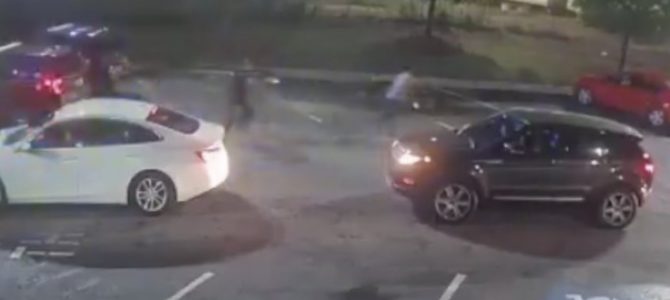The death of Rayshard Brooks at the hands of Atlanta police officer Garrett Rolfe is a tragedy. Brooks was discovered by police asleep behind the wheel at a Wendy’s drive through. After apparently failing a field sobriety test, officers attempted to cuff Brooks, who resisted, stole an officer’s Taser and attempted to flee while pointing and seeming to fire the Taser at Rolfe. It is a sad story of a situation that got badly out of hand, but the rush to judgment against Rolfe by many in the media is misguided.
Over Saturday night as protesters burned down the Wendy’s in question, outlets like CNN were painting the police in the worst possible light, attempting clearly to link the shooting to the outrage over the killing of George Floyd. Sometimes this took the form of straight up lying, such as CNN legal analyst Areva Martin saying Brooks was unarmed.
Ah here is the clip that I think @BlueBoxDave was talking about.
This lie came courtesy of CNN legal analyst Areva Martin, someone we've written plenty about at NewsBusters https://t.co/OoMJDQUkBq pic.twitter.com/aMXgq2Iysd
— Curtis Houck (@CurtisHouck) June 14, 2020
“We now have yet another death of an unarmed African American man,” Martin says. It’s a bizarre untruth especially from a legal analyst. On Sunday another CNN guest would say that Brooks was “compliant” with police even though he clearly refuses to be handcuffed and assaults the officers before stealing the Taser.
But even those on the left who are not telling flat out lies are misrepresenting the incident in almost every way they can to poison the public’s views of the police action. “He was running away,” they say, “Tasers aren’t lethal,” they go on. What gets short if any shrift at all is that Brooks was firing a weapon at police that could incapacitate them, leaving them at Brooks’ mercy.
Police are in some sense like NFL refs; they are expected to make a decision in a split second that we can then scrutinize with endless slow motion replays. It is essentially an impossible ask and no replay booth can bring back a lost life. What makes the Brooks and Floyd killings so entirely different is time itself.
As Derek Chauvin drove his knee into George Floyd’s neck, a nearly nine-minute eternity occurred, during which time any of the officers should have saved Floyd’s life. The shooting in Atlanta could not be more different. A suspect attacks, steals a weapon, runs while aiming and possibly shooting it all in a matter of seconds. The incident is over almost before it starts.
It can be argued that the officers should have deescalated the situation, they could have simply given him a warning and told him to call an Uber, perhaps. The assumption being that this was a simple police interaction. But there is no such thing as a simple police interaction. Anytime police confront a suspect even on the most minor charge the possibility exists that the person could have warrants, could be looking at jail time, and could act accordingly.
The important thing to remember about police and the extraordinary powers we give them is that we do it because crime is inherently chaotic. The police have to play by rules; criminals by their very nature do not. This more than anything else is why kids (and some adults) have to be taught the right way to deal with police, and this goes for protestors too.
It’s pretty simple. If the police stop you just do what they say. If mistakes are made; complain about it later. The police don’t know who you are or what you are capable of doing. This does not give them a free pass when people resist, but it does put them in a dangerous and difficult situation that often leads to harm. Not only is obeying the police lawfully required, it is also the best way to keep everyone safe.
After the Boston Massacre in 1770 it was John Adams who defended the British soldiers who had fired on the angry crowd of patriots. The soldiers probably could have handled the situation better, leading to less loss of life, but Adams understood that was not the standard. He understood that the law gives those entrusted with keeping order, especially through violence, a lot of latitude on the use of force.
Six of the soldiers were acquitted, two found guilty not of murder but of manslaughter. It was a lesson for our nascent nation that taught us the value of rule of law, even when it protected the very powers the founders would soon be at war against. That is to say, no matter the righteous passions of protesters demanding police accountability, Garrett Rolfe must be tried based on the law, not based on the societal moment.
The fact of the matter is that if you are in a dark parking lot, you resist arrest, steal a cop’s Taser, point it at him and fire, there is a very good likelihood you will be shot. This is not the George Floyd case and a rush to judgment will only inflame, not soothe the mood of our angry country.








